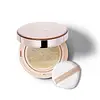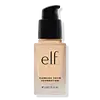What's inside
What's inside
 Key Ingredients
Key Ingredients

 Benefits
Benefits

 Concerns
Concerns

No concerns
 Ingredients Side-by-side
Ingredients Side-by-side

Water
Skin ConditioningIsododecane
EmollientCyclopentasiloxane
EmollientGlycerin
HumectantButylene Glycol
HumectantIsononyl Isononanoate
EmollientTitanium Dioxide
Cosmetic ColorantPhenyl Trimethicone
Skin ConditioningDimethicone
EmollientPEG-9 Polydimethylsiloxyethyl Dimethicone
EmulsifyingVinyl Dimethicone/Methicone Silsesquioxane Crosspolymer
Methyl Methacrylate Crosspolymer
Acrylates/Polytrimethylsiloxymethacrylate Copolymer
Skin ConditioningCaprylyl Methicone
Skin ConditioningTridecyl Trimellitate
EmollientBis-PEG/PPG-14/14 Dimethicone
Emollient1,2-Hexanediol
Skin ConditioningMagnesium Sulfate
Bisabolol
MaskingAcrylates/Ethylhexyl Acrylate/Dimethicone Methacrylate Copolymer
Skin ConditioningPhenoxyethanol
PreservativeHydrated Silica
AbrasiveTriethoxycaprylylsilane
Disteardimonium Hectorite
StabilisingAluminum Hydroxide
EmollientHydrogen Dimethicone
Silica Dimethyl Silylate
EmollientAlumina
AbrasiveAroma
Perfluorooctyl Triethoxysilane
Ethylhexylglycerin
Skin ConditioningAloe Barbadensis Leaf Juice
Skin ConditioningCaesalpinia Spinosa Fruit Extract
Skin ProtectingKappaphycus Alvarezii Extract
Skin ConditioningPropanediol
SolventCentella Asiatica Extract
CleansingHelichrysum Stoechas Extract
TonicMoringa Oleifera Seed Extract
Skin ConditioningPentylene Glycol
Skin ConditioningCaprylyl Glycol
EmollientDisodium Phosphate
BufferingCitric Acid
BufferingCI 77891
Cosmetic ColorantCI 77492
Cosmetic ColorantCI 77499
Cosmetic ColorantCI 77491
Cosmetic ColorantWater, Isododecane, Cyclopentasiloxane, Glycerin, Butylene Glycol, Isononyl Isononanoate, Titanium Dioxide, Phenyl Trimethicone, Dimethicone, PEG-9 Polydimethylsiloxyethyl Dimethicone, Vinyl Dimethicone/Methicone Silsesquioxane Crosspolymer, Methyl Methacrylate Crosspolymer, Acrylates/Polytrimethylsiloxymethacrylate Copolymer, Caprylyl Methicone, Tridecyl Trimellitate, Bis-PEG/PPG-14/14 Dimethicone, 1,2-Hexanediol, Magnesium Sulfate, Bisabolol, Acrylates/Ethylhexyl Acrylate/Dimethicone Methacrylate Copolymer, Phenoxyethanol, Hydrated Silica, Triethoxycaprylylsilane, Disteardimonium Hectorite, Aluminum Hydroxide, Hydrogen Dimethicone, Silica Dimethyl Silylate, Alumina, Aroma, Perfluorooctyl Triethoxysilane, Ethylhexylglycerin, Aloe Barbadensis Leaf Juice, Caesalpinia Spinosa Fruit Extract, Kappaphycus Alvarezii Extract, Propanediol, Centella Asiatica Extract, Helichrysum Stoechas Extract, Moringa Oleifera Seed Extract, Pentylene Glycol, Caprylyl Glycol, Disodium Phosphate, Citric Acid, CI 77891, CI 77492, CI 77499, CI 77491
Water
Skin ConditioningDimethicone
EmollientCyclopentasiloxane
EmollientGlycerin
HumectantIsododecane
EmollientPropylene Glycol
HumectantCetyl PEG/PPG-10/1 Dimethicone
EmulsifyingCyclohexasiloxane
EmollientC12-15 Alkyl Benzoate
AntimicrobialTridecyl Trimellitate
EmollientSorbitan Sesquioleate
EmulsifyingDimethicone/Vinyl Dimethicone Crosspolymer
Skin ConditioningBoron Nitride
AbsorbentPolymethyl Methacrylate
Magnesium Sulfate
Phenoxyethanol
PreservativeDisteardimonium Hectorite
StabilisingPEG/PPG-15/15 Dimethicone
EmulsifyingMagnesium Palmitate
Magnesium Stearate
Cosmetic ColorantSilica Dimethyl Silylate
EmollientEthylhexylglycerin
Skin ConditioningCaprylyl Glycol
EmollientParfum
MaskingSilica
AbrasiveTriethoxycaprylylsilane
CI 77891
Cosmetic ColorantIron Oxides
Water, Dimethicone, Cyclopentasiloxane, Glycerin, Isododecane, Propylene Glycol, Cetyl PEG/PPG-10/1 Dimethicone, Cyclohexasiloxane, C12-15 Alkyl Benzoate, Tridecyl Trimellitate, Sorbitan Sesquioleate, Dimethicone/Vinyl Dimethicone Crosspolymer, Boron Nitride, Polymethyl Methacrylate, Magnesium Sulfate, Phenoxyethanol, Disteardimonium Hectorite, PEG/PPG-15/15 Dimethicone, Magnesium Palmitate, Magnesium Stearate, Silica Dimethyl Silylate, Ethylhexylglycerin, Caprylyl Glycol, Parfum, Silica, Triethoxycaprylylsilane, CI 77891, Iron Oxides
Ingredients Explained
These ingredients are found in both products.
Ingredients higher up in an ingredient list are typically present in a larger amount.
Caprylyl Glycol is a humectant and emollient, meaning it attracts and preserves moisture.
It is a common ingredient in many products, especially those designed to hydrate skin. The primary benefits are retaining moisture, skin softening, and promoting a healthy skin barrier.
Though Caprylyl Glycol is an alcohol derived from fatty acids, it is not the kind that can dry out skin.
This ingredient is also used as a preservative to extend the life of products. It has slight antimicrobial properties.
Learn more about Caprylyl GlycolCi 77891 is a white pigment from Titanium dioxide. It is naturally found in minerals such as rutile and ilmenite.
It's main function is to add a white color to cosmetics. It can also be mixed with other colors to create different shades.
Ci 77891 is commonly found in sunscreens due to its ability to block UV rays.
Learn more about CI 77891Cyclopentasiloxane, or D5, is a silicone used to improve texture of products and trap moisture.
D5 is considered lightweight and volatile. Volatile means it evaporates quickly after application. Once evaporated, D5 leaves a thin barrier that helps keep skin hydrated.
It is also an emollient. Emollients help soften the skin and prevent water loss. Silicones create a silky texture in products. D5 helps other ingredients become more spreadable.
Studies show D5 is safe to use in skincare products. We recommend speaking with a skincare professional if you have concerns.
Learn more about CyclopentasiloxaneDimethicone is a type of synthetic silicone created from natural materials such as quartz.
What it does:
Dimethicone comes in different viscosities:
Depending on the viscosity, dimethicone has different properties.
Ingredients lists don't always show which type is used, so we recommend reaching out to the brand if you have questions about the viscosity.
This ingredient is unlikely to cause irritation because it does not get absorbed into skin. However, people with silicone allergies should be careful about using this ingredient.
Note: Dimethicone may contribute to pilling. This is because it is not oil or water soluble, so pilling may occur when layered with products. When mixed with heavy oils in a formula, the outcome is also quite greasy.
Learn more about DimethiconeDisteardimonium Hectorite comes from the clay mineral named hectorite. It is used to add thickness to a product.
It can also help stabilize a product by helping to disperse other ingredients.
Hectorite is a rare, white clay mineral.
Learn more about Disteardimonium HectoriteEthylhexylglycerin (we can't pronounce this either) is commonly used as a preservative and skin softener. It is derived from glyceryl.
You might see Ethylhexylglycerin often paired with other preservatives such as phenoxyethanol. Ethylhexylglycerin has been found to increase the effectiveness of these other preservatives.
Glycerin is already naturally found in your skin. It helps moisturize and protect your skin.
A study from 2016 found glycerin to be more effective as a humectant than AHAs and hyaluronic acid.
As a humectant, it helps the skin stay hydrated by pulling moisture to your skin. The low molecular weight of glycerin allows it to pull moisture into the deeper layers of your skin.
Hydrated skin improves your skin barrier; Your skin barrier helps protect against irritants and bacteria.
Glycerin has also been found to have antimicrobial and antiviral properties. Due to these properties, glycerin is often used in wound and burn treatments.
In cosmetics, glycerin is usually derived from plants such as soybean or palm. However, it can also be sourced from animals, such as tallow or animal fat.
This ingredient is organic, colorless, odorless, and non-toxic.
Glycerin is the name for this ingredient in American English. British English uses Glycerol/Glycerine.
Learn more about GlycerinIsododecane is a fragrance, emollient, and solvent.
As an emollient, it helps your skin stay soft and hydrated. Emollients help trap moisture into your skin.
Isododecane's role as a solvent makes it a great texture enhancer. It spreads smoothly on skin and does not leave a sticky feeling behind. Isododecane also helps prevent color transfer in makeup products.
Isododecane is not absorbed into skin.
Learn more about IsododecaneMagnesium Sulfate is a salt. More specifically, it is an epsom salt, or the bath salt used to help relieve muscle aches.
Despite having ‘sulfate’ in the name, it isn’t a surfactant or cleansing agent like sodium lauryl sulfate. Unlike those sulfates, magnesium sulfate doesn’t have the same cleansing or foaming properties (it's simply a type of salt).
In cosmetics, Magnesium Sulfate is used to thicken a product or help dilute other solids. It is a non-reactive and non-irritating ingredient.
One study shows magnesium deficiency may lead to inflammation of the skin. Applying magnesium topically may help reduce inflammation.
You can find this ingredient in sea water or mineral deposits.
Learn more about Magnesium SulfatePhenoxyethanol is a preservative that has germicide, antimicrobial, and aromatic properties. Studies show that phenoxyethanol can prevent microbial growth. By itself, it has a scent that is similar to that of a rose.
It's often used in formulations along with Caprylyl Glycol to preserve the shelf life of products.
This silica is mainly used to thicken oils and suspend particles in oils. It is not water soluble.
According to the manufacturer, it:
The manufacturer also claims this ingredient to be useful in makeup.
In lipstick formulations, this ingredient improves color payoff, reduces pigment settling, and reduces oil bleeding. This ingredient also improves the grip of powder products such as dry shampoos.
Learn more about Silica Dimethyl SilylateTridecyl Trimellitate is a synthetic ingredient with emollient and skin conditioning properties. It also acts as a texture enhancer and helps products spread easily without feeling greasy.
As an emollient, it forms a light layer on the skin that keeps moisture in and improves water resistance. This is why you'll often find this ingredient in eye creams and other rich treatments.
This ingredient is seen as the elegant alternative to mineral oil.
Learn more about Tridecyl TrimellitateTriethoxycaprylylsilane is a silicone used to bind and stabilize ingredients.
As an emulsifier, it helps prevent ingredients from separating. This can help elongate the shelf life of products.
Triethoxycaprylylsilane is often used to coat mineral sunscreens ingredients to help give a better feel. It also helps reduce oxidative stress in sunscreens.
Learn more about TriethoxycaprylylsilaneWater. It's the most common cosmetic ingredient of all. You'll usually see it at the top of ingredient lists, meaning that it makes up the largest part of the product.
So why is it so popular? Water most often acts as a solvent - this means that it helps dissolve other ingredients into the formulation.
You'll also recognize water as that liquid we all need to stay alive. If you see this, drink a glass of water. Stay hydrated!
Learn more about Water